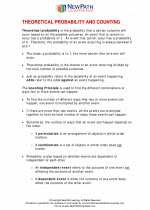Common Logarithm
A common logarithm is a logarithm with a base of 10. It is often denoted as log10 or simply log. The common logarithm of a number is the exponent to which 10 must be raised to produce that number. In other words, if y = log10(x), then 10y = x.
Properties of Common Logarithms
Here are some important properties of common logarithms:
- log(1) = 0: Since 100 = 1, the common logarithm of 1 is 0.
- log(10) = 1: Since 101 = 10, the common logarithm of 10 is 1.
- log(x * y) = log(x) + log(y): The logarithm of a product is the sum of the logarithms of the factors.
- log(x / y) = log(x) - log(y): The logarithm of a quotient is the difference of the logarithms of the numerator and denominator.
- log(xn) = n * log(x): The logarithm of a power is the exponent times the logarithm of the base.
Example Problems
Let's work through some example problems to better understand common logarithms:
Example 1: Find the common logarithm of 100.
Solution: Since 102 = 100, the common logarithm of 100 is 2. Therefore, log(100) = 2.
Example 2: Simplify log(10) + log(100).
Solution: Using the property log(x * y) = log(x) + log(y), we can simplify log(10) + log(100) as log(10 * 100) = log(1000). Since 103 = 1000, the simplified form is log(1000) = 3.
Study Guide
Here are some key points to remember when studying common logarithms:
- Understand the definition of a common logarithm and how it relates to exponentiation with a base of 10.
- Memorize the properties of common logarithms, especially the rules for products, quotients, and powers.
- Practice simplifying expressions involving common logarithms using the properties.
- Work through example problems to reinforce your understanding of common logarithms.
- Explore real-world applications of common logarithms, such as in measuring the intensity of earthquakes using the Richter scale.
By mastering common logarithms and their properties, you'll be well-equipped to solve a variety of logarithmic equations and apply them to practical problems.
.◂Math Worksheets and Study Guides Eighth Grade. Theoretical probability and counting

 Worksheet/Answer key
Worksheet/Answer key
 Worksheet/Answer key
Worksheet/Answer key
 Worksheet/Answer key
Worksheet/Answer key
